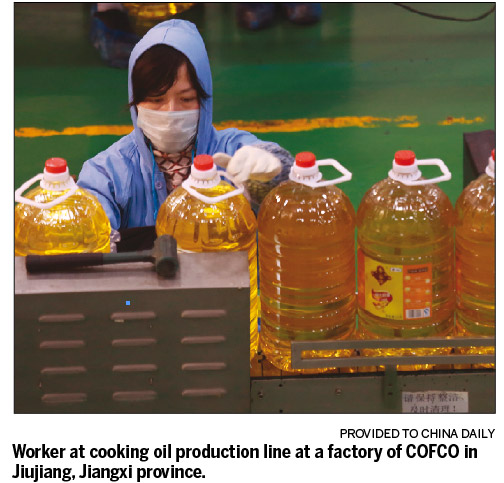Recent merger gives greater access to Latin American grain
China has gained improved access to major grain-growing regions in Latin America through a recent merger with a Dutch agricultural commodities trader, which has many sources in the region.
Chinese State-owned food giant COFCO — China National Cereals, Oils and Foodstuffs Corp — recently announced a $1.2 billion deal to buy 51 percent of Netherlands-based grain trader Nidera NV.

Observers regard the merger as an important move for Chinese agricultural companies to get more involved in Latin American countries, especially Brazil and Argentina, which are both Nidera"s traditional sources.
"Nidera has a strong source platform in Brazil, Argentina and Central Europe as well as a global trading network, which can further extend COFCO"s global presence and create new opportunities," said Yu Xubo, president of COFCO during the signing ceremony, adding the deal is a "win-win" for the two companies.
The agreement comes amid China"s increasing investment in food assets overseas in recent years. The net imports of China"s three major grains — wheat, corn and rice — surged in the first 10 months of 2012 and reached more than 11 million metric tons in 2013, according to the China"s Customs.
"Such need drives Chinese agricultural companies to find more stable and safe sources around the world. Brazil has great advantages in climate and natural resources which means large potentials in the agricultural industry," said Zhou Zhiwei, a researcher on Brazilian studies at the Chinese Academy of Social Sciences.
The bilateral trade in agriculture between China and Brazil has witnessed a sharp increase in the past 10 years and China became Brazil"s largest export market for agricultural commodities in 2013, with a trade amount of $22.8 billion, according to China"s Ministry of Commerce.
In the meantime, the Brazilian government has repeatedly expressed its willingness to expand its current trade with China in this area. Senator Katia Abreu, president of the Brazilian Confederation of Agriculture and Livestock, said during her visit to Beijing in 2012 that Brazil wants to export more kinds of dairy and meat products to China.
"The agricultural cooperation between China and Brazil has good opportunities right now. Both sides share the willingness to develop such cooperation. I think agriculture will be a main part of the future cooperation of the two countries," she said.
Besides grain imports, many Chinese companies eye Brazil and other countries in the region as great sources to find high-quality raw agricultural materials for their products.
BY-HEALTH Corp, China"s leading dietary supplement enterprise based in Guangdong province, signed a formal contract in 2012 with its first exclusive material supplier Apis Flora in Brazil to import propolis and built its first global material base in northeast Brazil with local company Duas Rodas to grow acerola cherry.
The base is a part of the company"s strategy of sourcing raw materials globally, according to BY-HEALTH Vice-President Liang Shuisheng.
New Hope Group, one of China"s largest private enterprises in the dairy, animal feed and meat products sectors based in Sichuan province, shares a similar strategy. The company recently developed a new infant formula with a New Zealand company, promising the formula is produced with the best resources in New Zealand.


















